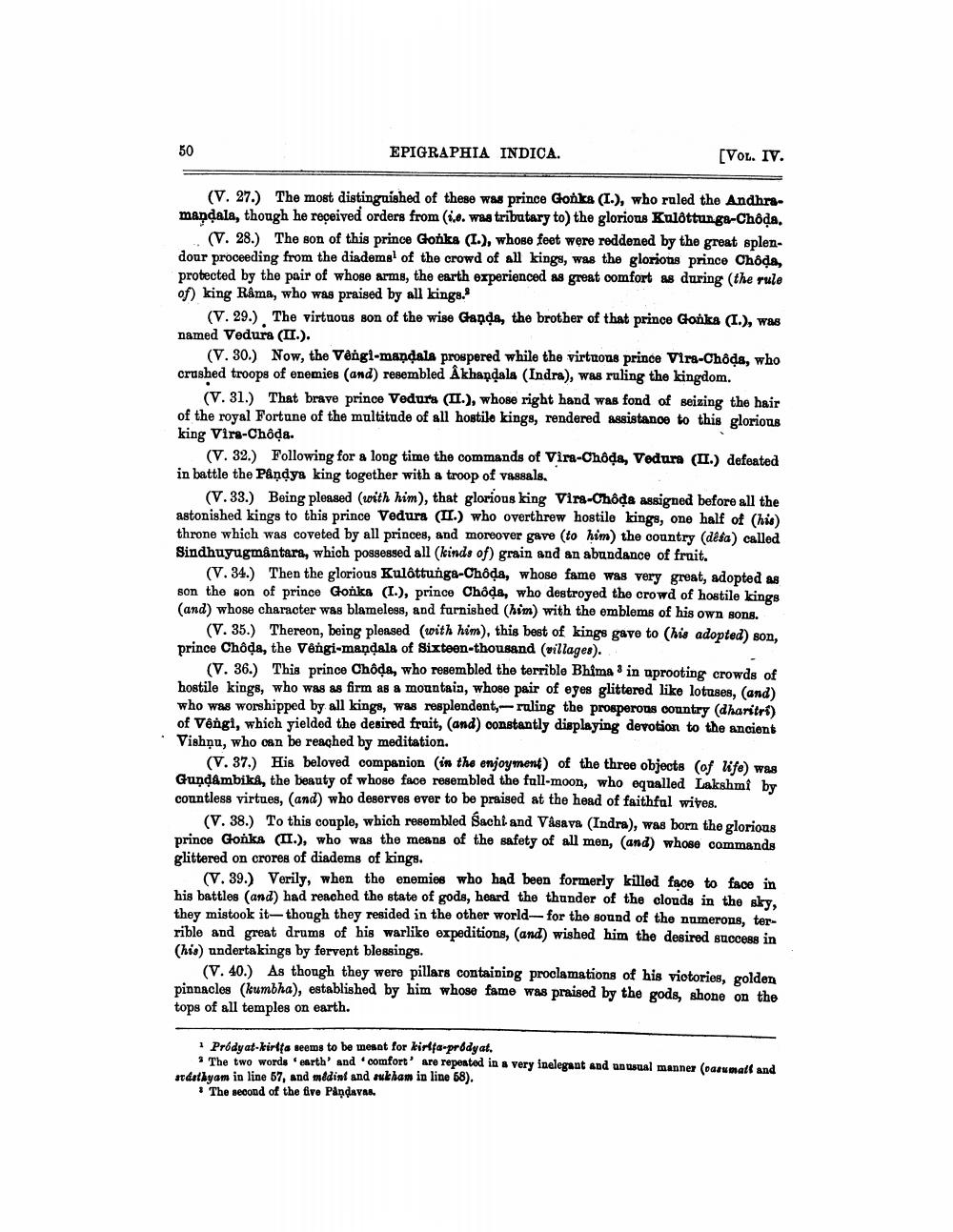________________
50
EPIGRAPHIA INDICA.
[VOL. IV.
(V. 27.) The most distinguished of these was prince Gonka (I.), who ruled the Andhramandala, though he received orders from (ie. was tributary to) the glorious Kulôttunga-Chôḍa.
(V. 28.) The son of this prince Gonka (I.), whose feet were reddened by the great splendour proceeding from the diadems1 of the crowd of all kings, was the glorious prince Chôda, protected by the pair of whose arms, the earth experienced as great comfort as during (the rule of) king Rama, who was praised by all kings.
(V. 29.) The virtuous son of the wise Ganda, the brother of that prince Gonka (I.), was named Vedura (II.).
(V. 30.) Now, the Vengi-mandala prospered while the virtuous prince Vira-Chôḍa, who crushed troops of enemies (and) resembled Akhandala (Indra), was ruling the kingdom.
(V. 31.) That brave prince Vedura (II.), whose right hand was fond of seizing the hair of the royal Fortune of the multitude of all hostile kings, rendered assistance to this glorious king Vira-Chôḍa.
(V. 32.) Following for a long time the commands of Vira-Chôda, Vedura (II.) defeated in battle the Pandya king together with a troop of vassals.
(V.33.) Being pleased (with him), that glorious king Vira-Chôda assigned before all the astonished kings to this prince Vedura (II.) who overthrew hostile kings, one half of (his) throne which was coveted by all princes, and moreover gave (to him) the country (dêsa) called Sindhuyugmântara, which possessed all (kinds of) grain and an abundance of fruit.
(V. 34.) Then the glorious Kulôttunga-Chôda, whose fame was very great, adopted as son the son of prince Gonka (I.), prince Chôda, who destroyed the crowd of hostile kings (and) whose character was blameless, and furnished (him) with the emblems of his own sons.
(V. 35.) Thereon, being pleased (with him), this best of kings gave to (his adopted) son, prince Chôḍa, the Vengi-mandala of Sixteen-thousand (villages).
(V. 36.) This prince Chôda, who resembled the terrible Bhima 3 in uprooting crowds of hostile kings, who was as firm as a mountain, whose pair of eyes glittered like lotuses, (and) who was worshipped by all kings, was resplendent, ruling the prosperous country (dharitri) of Vêngi, which yielded the desired fruit, (and) constantly displaying devotion to the ancient Vishnu, who can be reached by meditation.
(V. 37.) His beloved companion (in the enjoyment) of the three objects (of life) was Guṇḍâmbika, the beauty of whose face resembled the full-moon, who equalled Lakshmi by countless virtues, (and) who deserves ever to be praised at the head of faithful wives.
(V. 38.) To this couple, which resembled Sachi and Vasava (Indra), was born the glorious prince Gonka (II.), who was the means of the safety of all men, (and) whose commands glittered on crores of diadems of kings.
(V. 39.) Verily, when the enemies who had been formerly killed face to face in his battles (and) had reached the state of gods, heard the thunder of the clouds in the sky, they mistook it-though they resided in the other world-for the sound of the numerons, terrible and great drums of his warlike expeditions, (and) wished him the desired success in (his) undertakings by fervent blessings.
(V. 40.) As though they were pillars containing proclamations of his victories, golden pinnacles (kumbha), established by him whose fame was praised by the gods, shone on the tops of all temples on earth.
Pródyat-kirtta seems to be meant for kirita-pródyat.
The two words earth' and comfort' are repeated in a very inelegant and unusual manner (casumatt and stasthyam in line 57, and médint and sukham in line 58).
The second of the five Pandavas.




